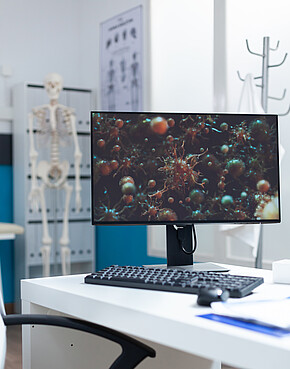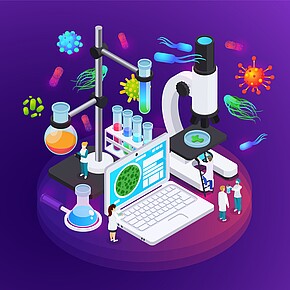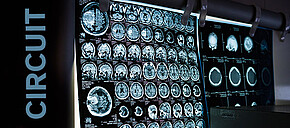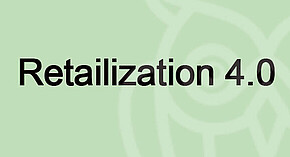Selection of current projects
There are currently around 20 different research projects in the Department of Information Technologies and Digitalisation. You can read about a small selection here.
All projects of the Department of Information Technologies and Digitalisation can be found in the Research Portal.
PharmTechTrust
The research project "PharmTechTrust" aims to ensure the trustworthiness of digital technologies in pharmaceutical production.
Project details:
Project leader: Jakob Rehrl
Duration: October 1, 2024 - September 30, 2025
Funding body: FFG
Project volume: approx. € 19,000 (FFG)
Short description:
The digital transformation in the pharmaceutical industry has the potential to revolutionize the development and manufacture of medicines. By integrating digital tools such as AI/ML-based digital twins, process control and human-in-the-loop concepts, efficiency can be increased, costs reduced and product quality improved. This is particularly important in view of current challenges such as supply chain problems, drug shortages and the high ecological burden of pharmaceutical processes.
However, the implementation of digital algorithms in the pharmaceutical industry faces significant challenges due to their conservative and highly regulated nature. To integrate digital algorithms into existing manufacturing processes, companies must revise documentation and demonstrate compliance with the strict requirements of Good Manufacturing Practice (GMP).
This exploratory project offers a technical solution by proposing a framework for the regulatory assessment of digital algorithms. The project identifies critical regulatory aspects of digital technologies in the pharmaceutical industry. The technical framework is developed in compliance with these regulations and uses the digital algorithms from RCPE's algorithm library.
Breakthrough and innovations:
Compliant framework: Development of a technical framework that ensures that digital algorithms comply with regulatory standards. For the first time, a workflow for the regulatory assessment of algorithms, such as process control, will be created and published transparently.
Blueprint for companies: Companies that have previously been hesitant to implement digital algorithms due to concerns about regulatory rejection can use this workflow as a blueprint. This is intended to facilitate the digitization of GMP-compliant industrial environments and address issues such as 'careful and sustainable use of resources', 'reliability' and 'dependency reduction'.
As the technologies involved improve product quality, lower operating costs and reduce resource consumption, the project will have a positive impact on patient safety, supply chain issues and sustainability. In addition, industrial digitization will increase attractiveness and facilitate the relocation of European manufacturing sites.
AIBIA - Artificial Intelligence in Biomedical Image Analysis

The AIBIA project is a joint initiative with the University of Salzburg (PLUS) and is funded by the State of Salzburg Seedfund (WISS2025) to initiate projects with local partners such as SALK and PMU. The focus of this project is on the automated processing and analysis of biomedical visual data using advanced AI techniques to overcome the challenges in clinical applications as well as in the field of empirical research.
Project details:
Project leader: Michael Gadermayr
Duration: January 1, 2023 – December 31, 2025
Funding body: State of Salzburg WISS2025
Project volume: approx. € 125,000
Project description:
The AIBIA project focuses on the use of AI-driven methods to analyze biomedical visual data, thus addressing a significant gap in Salzburg's current research landscape. The region is home to numerous life science and clinical research groups (PMU, SALK, PLUS) that generate large amounts of biomedical visual data. However, these groups often lack the necessary expertise and human resources to fully exploit these data for research purposes. At the same time, local groups with the necessary expertise (PLUS and FHS) face resource problems as their staff is predominantly project-funded and cannot be used for other tasks.
Strategic goals:
The establishment of the "Research and Transfer Junior Lab on AI in Biomedical Image Analysis (AIBIA)" aims to:
- Promote collaborative research: To act as an incubator for future high-profile, third-party funded research projects (e.g. FWF and EU projects).
- Pooling resources and expertise: A merger of experts from PLUS (group of Andreas Uhl) and FHS enables efficient communication and project initiation.
- Strengthening interdisciplinary collaboration: To serve as a crystallization point for a competence network and to promote the training of a significant number of young researchers.
- Human capital development: To provide a talent source for future scientific projects and institutional roles (e.g. Core Facility PMU) in the field of life sciences.
- Supporting local industry: To create an attractive human resource for companies in this field and thereby potentially increase related FFG project activities.
This initiative promises to significantly improve the research landscape in Salzburg, advance the integration of AI in biomedical image analysis and foster a sustainable ecosystem for future innovations.
IAI - Industrial Artificial Intelligence

The "Industrial Artificial Intelligence" (IAI) project is a major initiative led by Stefan Huber and is funded by the State of Salzburg as part of the WISS2025 program. The aim of the project is to research and optimize the diverse application possibilities of artificial intelligence (AI) in industry.
Project details:
Project manager: Stefan Huber
Duration: September 1, 2023 - November 30, 2024
Funding body: State of Salzburg WISS2025
Project volume: approx. € 60,000
Project description:
Artificial intelligence (AI) is a key technology that helps to overcome numerous challenges in society and the economy. Especially with regard to climate change and the United Nations Sustainable Development Goals (SDGs), AI offers a wide range of optimization options.
Building on our existing research strategy, the project focuses on the industrial application area and combines this with machine learning (ML) methods. In this way, we not only contribute to the energy transition and resource conservation, but also strengthen the economic security of the location.
Strategic goals and research priorities:
The IAI project is investigating three central topics that build on previous research projects:
Application of ML in mechatronics:
- Example a: Investigation of the possible uses of SGD optimizers in ML frameworks for classic mechatronic problems.
- Example b: Research into energy optimization in the motion planning of kinematically underdetermined robots using reinforcement learning (RL), since classic methods such as the algebraic solution of inverse kinematics are not designed for this.
Ability to integrate AI methods into industrial systems:
- Investigation of architectures that enable and promote the integration of AI methods into industrial systems.
Economic decision-making based on ML predictions:
- Research into the derivation of business indicators from ML predictions and their linking with the forecast results in order to enable well-founded business decisions.
Our mission:
Our goal is to further research and optimize the application possibilities of AI in industry through practice-oriented research and close cooperation with partners from science, business and public administration. We want to develop innovative strategies that not only increase the competitiveness of companies, but also make a sustainable contribution to society.
BIOCONTROL

Model-based strategy for the optimal operation of bioreactors.
The "BIOCONTROL" project continues the BIOPTI preliminary study funded by the FFG and is carried out under the direction of Jakob Rehrl. The aim of the project is to develop a standardized workflow to optimize the operating strategy of bioreactors.
Project details:
- Project manager: Jakob Rehrl
- Duration: October 1, 2024 - September 30, 2027
- Funding body: FFG
- Project volume: approx. € 126,000
Project description:
The BIOCONTROL project is of great importance because bioprocesses are essential for the production of many pharmaceuticals. In order to ensure the security of supply of biopharmaceuticals even in times of crisis, Austria must remain attractive as a production location. This requires cost-effective operating strategies to prevent pharmaceutical manufacturers from moving away while reducing environmental and climate impact.
Strategic goals and research priorities:
The project aims to improve the efficiency and sustainability of bioprocesses using a model-based approach. The main research focuses include:
Development of a standardized workflow:
- Creation of a workflow to optimize the operating strategies of bioreactors, based on the findings of the BIOPTI preliminary study.
Cost efficiency and production reliability:
- Optimization of production processes to reduce operating costs and increase the attractiveness of Austria as a production location. This should help to ensure the security of supply of biopharmaceuticals even in times of crisis.
Environmental and climate protection:
- Reduction of the resource requirements for the production of biopharmaceuticals in order to achieve positive environmental impacts and make a contribution to climate protection.
Our mission:
Our goal is to optimize the production of biopharmaceuticals through innovative research and the development of efficient operating strategies. We want to ensure that Austria remains an attractive location for the pharmaceutical industry and at the same time make a contribution to environmental protection.
AI4Green

Data Science for Sustainability
The project AI4GREEN aims to develop cross-border sustainable solutions to improve production processes in business and industry, in order to secure a livable future for future generations.
The project focuses on three main areas:
- CO2 reduction in agriculture
- Energy savings through optimized robot control
- Resource savings through product and process optimization
The Salzburg University of Applied Sciences is taking over the management of the pilot project "Energy savings through optimized robot control". Together we want to use artificial intelligence to develop sustainable solutions for a more environmentally friendly future.
Consortium coordinator: Kufstein University of Applied Sciences
Project management: Stefan Huber
Duration: 04/2024 - 2027
Funding body: INTERREG
SPARCMAT

Sparkling Science Matrix
In this project, in collaboration with students from the HTBLuVA Salzburg, Department of Biomedicine and Health Technology, the latest methods for quantifying tissue damage are being developed. Injuries and pathological changes to tendons represent a major challenge for orthopedics, especially because the number of these diseases increases sharply with age and injured tendons heal poorly. In addition to inflammatory processes, changes in the tendon structure and tendon cells are crucial for the development and progression of tendon diseases.
New studies on various tissues show that changes in the tendon structure lead to a change in the metabolism of the cells embedded in them, thus causing poorer healing and the formation of scars. Initial results suggest that similarly deregulated metabolic processes contribute to the poor healing ability of tendons. However, the background is still poorly known.
One aim of the project is to investigate these processes using extensive molecular and cell biological methods. Furthermore, a digital platform for the automated and objective evaluation of microscopic tissue sections is being sought. The students at HTBLuVA Salzburg are working with all cooperation partners to develop appropriate software tools for the automated quantification of digital images of tendons using AI-based techniques (e.g. "deep learning" and segmentation methods) and integrating them into a user-friendly app. The students will learn first-hand about both the technical and biological background of the still very new AI-based digital pathology.
The main contribution of the Salzburg University of Applied Sciences is the analysis of the created and digitized tissue sections using AI-based techniques. Knowledge generated in research and master's theses will be incorporated into a tool that can be used by life scientists within the project. This will create a contribution in the field of image processing as well as in the field of medicine/biology.
The project is funded by the Federal Ministry of Education, Science and Research (BMBWF) and the Agency for Education and Internationalization (OeAD) as part of the research funding program "Sparkling Science 2.0".
- Consortium coordinator: Paracelsus Medical University Salzburg (PMU), Institute for Tendon and Bone Regeneration Project management (FHS): Michael Gadermayr
- Duration: 10/2022 - 09/2025
- Funding body: BMBWF, OeAD
- Keywords: Image Processing, Machine Learning, Histopathology, Data Science
- Project website: DE: SPARCMAT - Sparkling Science Matrix EN: SPARCMAT - Sparkling Science Matrix
Knowledge Transfer Center West

Stimulus program for Austrian knowledge and technology transfer in Western Austria
With the creation of the three regional knowledge transfer centers (WTZ East, WTZ South and WTZ West), Austrian universities and technical colleges are making their contribution to intensifying knowledge transfer from science to business and society. The Knowledge Transfer Center West is the largest competence center for academic knowledge and technology transfer in Western Austria. Under the umbrella of the WTZ West, universities and technical colleges from Upper Austria, Salzburg, Tyrol and Vorarlberg are working together to create innovative approaches and new knowledge horizons, to sustainably intensify knowledge transfer and to deepen and expand cooperation with business and society as a whole. After two successful project rounds, the Knowledge Transfer Center West is now entering its third project round with this project. The participating universities - in cooperation with regional MINT initiatives and companies - are organizing various networking and exchange workshops, presenting educational offers and concepts and exchanging their results and experiences. MINT stands for "mathematics, computer science, natural sciences, technology".
The Salzburg University of Applied Sciences is involved in cooperation projects 1 and 2:
KV1: Further education, networking and internationalization (management: PLUS, participation FHS)
KV2: MINT (management: FHS)
The Salzburg University of Applied Sciences is designing a series of workshops together with OTELO Hallwang and Ing. Punzenberger Copadata GmbH to teach young people hardware-related programming. The main goal is to develop simple software programs for the Internet of Things and to arouse enthusiasm for technology and computer science.
The knowledge transfer centers are a network of universities and technical colleges and are funded by the Austria Business Service, with funds from the National Foundation for Research, Technology and Development (Austria Fund).
- Project coordinator: Paris Lodron University of Salzburg
- Project partner: WTZ West consortium, see project website
- Project partner from industry: OTELO Halwang, Ing. Punzenberger Copadata GmbH
- Project management (FHS): Kranzer Simon
- Duration: 09/2022 - 06/2024
- Funding body: aws (Austria Wirtschaftsservice)
- Keywords: knowledge transfer, Industry 4.0, MINT
- Project website: https://wtz-west.at
CIRCUIT

Towards a Comprehensive CBCT Imaging Pipeline for Real-time Acquisition, Analysis, Interaction and Visualization
CIRCIUT aims to optimize the recording and processing of so-called cone-beam computed tomography (CBCT) data. CBCT is a medical imaging modality based on X-rays and is a special form of CT. The aim of the project is, on the one hand, to optimize the interaction with the CBCT device. In addition, the image analysis should be improved so that the most accurate image analysis can be carried out using as few projections as possible. This should optimize the trade-off between minimal radiation and the highest level of diagnostic safety. For this purpose, the latest deep learning models are adapted, evaluated and expanded.
The CIRCUIT project combines the areas of computer vision and human computer interaction. The synergies achieved in this way make it possible to look at the process consisting of setup, image acquisition, automatic processing and expert-based analysis in a holistic manner. In this way, dependencies between the individual phases can be recognized as best as possible and used proactively to achieve the best possible overall result.
The project is funded by the Austrian Research Promotion Agency (FFG) as part of FFG-Bridge.
- Project management (FHS): Markus Tatzgern (MMT), Michael Gadermayr (ITS)
- Project team (FHS): Markus Tatzgern, Michael Gadermayr, Maximilian Tschuchnig
- Duration: 05/2022 - 04/2025
- Funding body: FFG Bridge
- Project partner: medPhoton GmbH
- Keywords: CBCT, Reconstruction, Computer Vision, Convolutional Neural Networks, HCI, Interaction
- Project website: CIRCUIT - Digital Realities Lab (mediacube.at)
Retailization 4.0

Digitalization is posing new challenges to the core business of traditional brick-and-mortar retailers. The question is increasingly being asked as to which digitalization steps should be sensibly taken in the physical store itself in order to keep brick-and-mortar retail spaces crisis-proof, productive, and competitive in the future.
In this context, the concept of Industry 4.0 has become established in industry in recent years. This involves the integration of the "Internet of Things and Services" into the industrial production process. In a "smart factory," machines, storage systems, and operating resources will be networked as cyber-physical systems (CPS). Intelligent machines, storage systems, and operating resources independently exchange information, trigger actions, and control one another. In this way, industrial processes can be fundamentally improved and new forms of value creation or new business models can be created. Stationary retail as an interaction of various actors along the supply chain and the resulting necessary convergence of various business competence areas (production, logistics, personnel and marketing) at the point of sale (POS) represent a similar environment to that in industry.
The aim of this project is therefore to transfer the already established concept of Industry 4.0 to stationary retail. In a cooperation between retail and IT companies, a transfer hub is being set up whose task is to install and test Industry 4.0 technologies at the POS. An interdisciplinary team combines expertise from strategic management research, innovation research, operations management, consumer behavior research, organizational research and ICT research. In contrast to other initiatives implemented in Austria, the focus is not on the efficiency of distribution logistics, i.e. the relationship between retailers and producers.
Rather, it is about the main actors in stationary retail: the employees and consumers. Technology should create sustainable benefits and quality of life for these user groups in stationary stores and also overcome ecological and social challenges at the POS. The following applies here: The use of technology is developed on people. People are not subordinated to the technology or the process. This approach is intended to identify potential for technologically strengthening stationary retail in different industries, types of business and ownership structures (especially SMEs).
Details can be found on the project website: More
- Project management (FHS): Robert Zniva (BWI)
- Deputy project management (FHS): Simon Kranzer (ITS)
- Project team: TEAM - Retailization 4.0
- Duration: July 2021 - June 2025
- Funding body: FFG Austrian Research Promotion Agency
- Keywords: Industry 4.0, Smart Factory, Industrial Informatics, Stationary Retail, AI, Smart Production
PRISMATICS

Privacy and Security for Modelling and Assessing Threats to Industrial Complex Systems
In the context of modern industrial applications (Industry 4.0), there is an increased digitization of the production process. In this process, spatially and/or logically separate production sites are linked in a heterogeneous environment with various participating actors. This process requires the exchange of data. On the one hand, this data can represent sensitive and security-relevant information for the companies involved, but on the other hand it can also contain personal data of end customers.
The aim of this project is to analyze representative processes in the industrial environment and to use privacy-preserving technologies to protect the data of end customers on the one hand and to enable an optimized production process that protects the information of companies on the other. The focus is particularly on weighing up privacy and security from a technical point of view in relation to the benefit for the process. As part of the project, typical, representative processes are analyzed together with regional companies and the data flows, the actors and the data categories are recorded. This information serves as the basis for a model-based analysis and modeling of the system.
On the basis of this model-based analysis, the actors involved and the (possibly hidden) data flows can be derived. This also includes a detailed content analysis of the data using machine learning, among other things. Both provide the basis for the targeted application of privacy-preserving technologies, whereby various technologies corresponding to the state of research are applied and evaluated in combination with cross-sectional technologies. The process goals should be able to be achieved within the given organizational, legal and technical framework; the data and privacy of the end customers should, however, be protected to the maximum.
- Project coordinator: Fachhochschule Salzburg GmbH (FHS)
- Project management (FHS): Günther Eibl
- Duration: May 1, 2021 - April 30, 2026
- Funding body: State of Salzburg WISS 2025
- Keywords: Industrial Security, Privacy and Security, Data Analytics
ECOSINT

Energy Community System Integration
The adoption of the Renewable Energy Expansion Act (EAG) created the legal basis and far-reaching opportunities for energy communities to make a significant contribution to the energy and climate transition as new players in the energy sector. The joint production and consumption of energy within the framework of local energy communities is particularly important. These Local Energy Communities (LECs), especially in the form of Renewable Energy Communities (EEG), have the potential to support the energy transition and are politically and socially supported at EU level, but also at national level. The regulatory and legal framework has been defined, but the technical implementation is still largely open.
A skilful and efficient integration of LECs into the overall system is necessary so that the LECs can, on the one hand, pursue their own goals, but on the other hand, make a contribution to the overall system. There is currently no vision for the digital integration of LECs. This poses the risk of a proliferation of different solutions that are inefficient, uncoordinated and cannot be expanded.
This is exactly where the ECOSINT project comes in: enabling the smart integration of LECs into the overall system. Overall, this project creates the basis for integrating and operating LECs efficiently and safely, ensuring their internal goals and at the same time optimizing the benefit for the overall energy system.
- Project coordinator: Salzburg University of Applied Sciences GmbH
- Project management : Günther Eibl
- Duration: March 2021 - August 2024
- Funding body: FFG Austrian Research Promotion Agency
- Project partners:
- Energie-Control Austria (E-Control)
- Energy Institute at the Johannes Kepler University Linz
- Netz Oberösterreich GmbH
- Salzburg Netz GmbH
- Green electricity exchange Salzburg
- Salzburg Research Forschungsgesellschaft mbH
- AIT Austrian Institute of Technology GmbH
- Siemens AG Austria
- Keywords: Local energy communities, IT architecture, privacy and security, expansion of renewable energies
